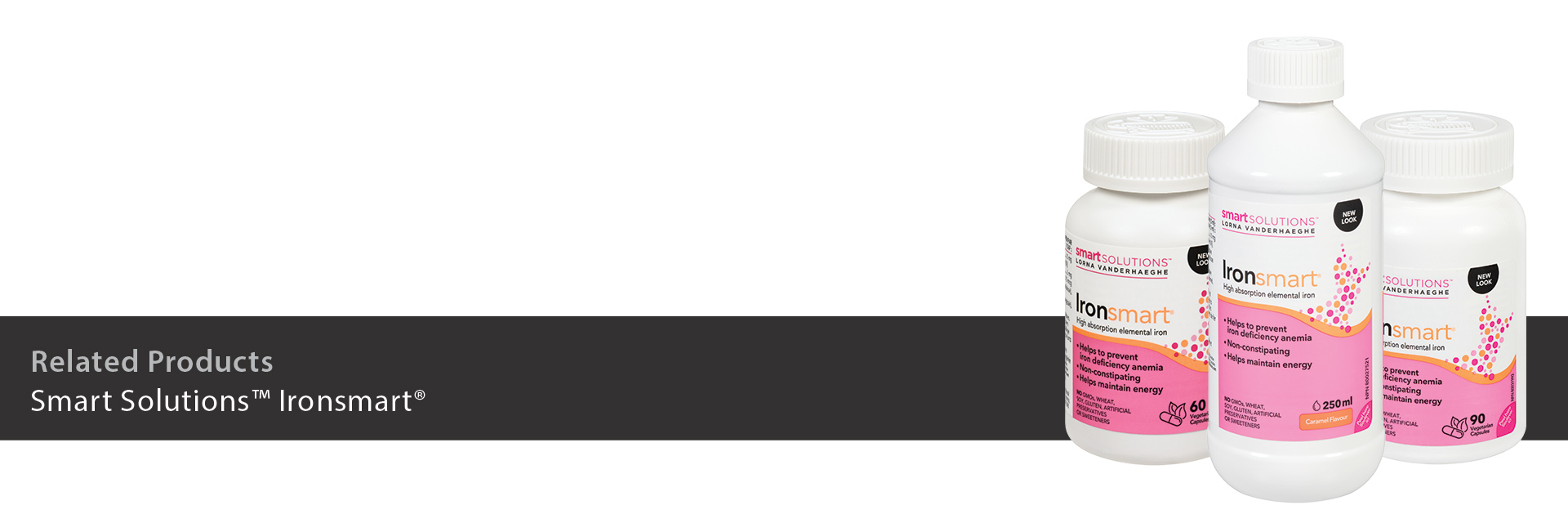

Iron 101
Imagine it: you wake up in the morning, immediately woozy and feeling weak. Getting through the day is more tiring than it should be. People might comment on your pale skin, saying you need to get some sun. When you speak to your doctor about your symptoms, he says you have an iron deficiency. Since iron deficiencies are incredibly common, many of us have a high chance of having an iron deficiency.1 We’re going to give you the 411 on iron deficiencies — from the benefits of iron, deficiencies in women, choosing an iron supplement and how iron works in the body.
WHY IS IRON IMPORTANT?
As one of the most vital parts of your blood, iron plays an essential piece of hemoglobin in your red blood cells — the protein that moves oxygen from your lungs to your body tissues.2 Iron also plays an important role in producing energy.2
Iron is an essential mineral as the body cannot produce it and must get it from food. There are two types of iron found in food— heme iron, which is found in animal proteins, and non-heme iron, which is found in plant-based proteins.2 When you have an iron deficiency and aren’t taking in the correct amount of iron, your red blood cells are not nearly as efficient with transporting oxygen around the body.
SIGNS + SYMPTOMS OF IRON DEFICIENCY
The World Health Organization predicts that 1/3 of all women of reproductive age are anemic3 making iron deficiency a significantly bigger problem for the female population. Why is that? Because during menstrual cycles, many women are prone to heavy periods that cause significant blood loss and, in turn, lower iron levels.2 In addition to the female period, women can also struggle with anemia during pregnancy due to higher iron requirements.2
Some symptoms of iron deficiency are easier to spot, such as dark circles under the eyes or being quick to bruise. However, some are a little trickier. Here are some of the main signs and symptoms of iron deficiency:4
- Increased weakness or fatigue
- Paleness
- Racing heart rate
- Dizziness
- Shortness of breath
- Difficulty learning & concentrating
- Pica – a craving for a nonfood item, like dirt
WHAT ARE THE BENEFITS OF IRON?
Since iron is one of the most important aspects of your day-to-day bodily functions, the benefits of iron run far and wide. Iron helps your body run at its peak form and keeps oxygen levels in the body high and healthy.
Menstruating women need approximately 18 mg of iron per day5 from food daily to replenish and maintain our iron stores, but most of us barely get enough. It’s important to focus on adding iron-rich foods to your diet to add to your daily recommended iron intake. Eating lean proteins, fortified breakfast cereals, increasing daily intake of leafy greens and even eating more dark chocolate can increase your iron levels.2
HOW TO KNOW WHICH IRON SUPPLEMENT IS RIGHT FOR YOU?
Although food first approach is always the best, it may be difficult to achieve the recommended daily allowance with food alone. We know that dietary heme is highly absorbed but that’s only by 25%.2 On the other hand, non-heme iron is only absorbed by 17%.2 Therefore, supplementation can be an option who are low on this important mineral.
When looking for an oral iron supplement, it’s important to remember that some iron supplements cause poor iron absorption, running the risk of an upset stomach like diarrhea and nausea.2 Another common complaint about iron supplementation is constipation and that’s due to the form of iron and how it absorbs in the body.2
GET THE MOST OUT OF YOUR IRON SUPPLEMENT
Smart Solutions Ironsmart Liquid is an effective way to prevent iron deficiency anemia and provides highly absorbable elemental iron which is non-constipating. It also helps form red blood cells and helps in their proper function. Each delicious caramel flavoured teaspoon provides 10 mg of elemental iron and is gluten free and vegan friendly. Iron Smart capsules are also a great and effective way to get enough iron.
To get the most out of your iron supplement, it’s best to take it few hours away from medication. Another handy tip is to have it with foods that contain vitamin C like orange juice as vitamin C helps the body improve iron absorption.2
It’s vital to ensure that you’re supplementing with iron and getting enough of it. Being iron deficient can cause a myriad of issues, from weakness and fatigue to decreasing concentration, so avoiding iron deficiency by incorporating iron into your health routine is extremely important!
References:
1. Iron sufficiency of Canadians. Statistics Canada: Canada’s national statistical agency / Statistique Canada : Organisme statistique national du Canada. (2012, November 21). Retrieved January 27, 2022, from https://www150.statcan.gc.ca/n1/pub/82-003-x/2012004/article/11742-eng.htm
2. Moustarah F, Mohiuddin SS. Dietary Iron. [Updated 2021 Apr 28]. In: StatPearls [Internet]. Treasure Island (FL): StatPearls Publishing; 2022 Jan-. Available from: https://www.ncbi.nlm.nih.gov/books/NBK540969/
3. World Health Organization. (n.d.). Anaemia. World Health Organization. Retrieved January 27, 2022, from https://www.who.int/health-topics/anaemia#tab=tab_1
4. Johnson, L. E. (2022, January 24). Iron deficiency – disorders of nutrition. Merck Manuals Consumer Version. Retrieved January 27, 2022, from https://www.merckmanuals.com/en-ca/home/disorders-of-nutrition/minerals/iron-deficiency
5. Institute of Medicine (US) Panel on Micronutrients. Dietary Reference Intakes for Vitamin A, Vitamin K, Arsenic, Boron, Chromium, Copper, Iodine, Iron, Manganese, Molybdenum, Nickel, Silicon, Vanadium, and Zinc. Washington (DC): National Academies Press (US); 2001. 9, Iron. Available from: https://www.ncbi.nlm.nih.gov/books/NBK222309/

